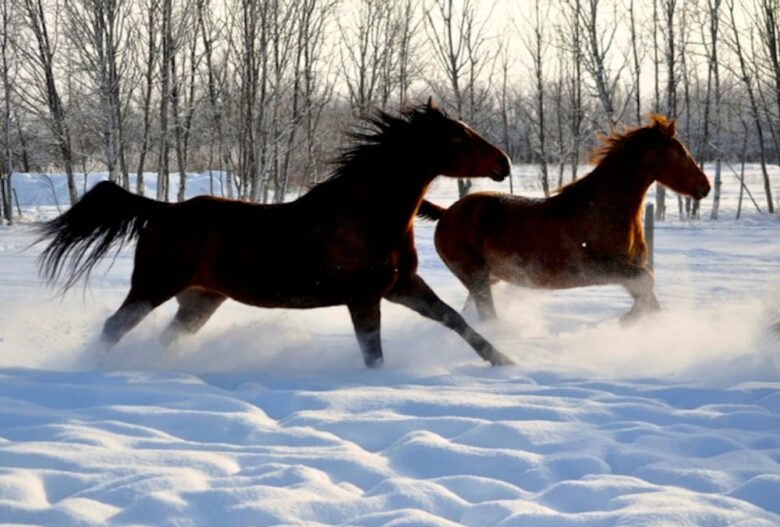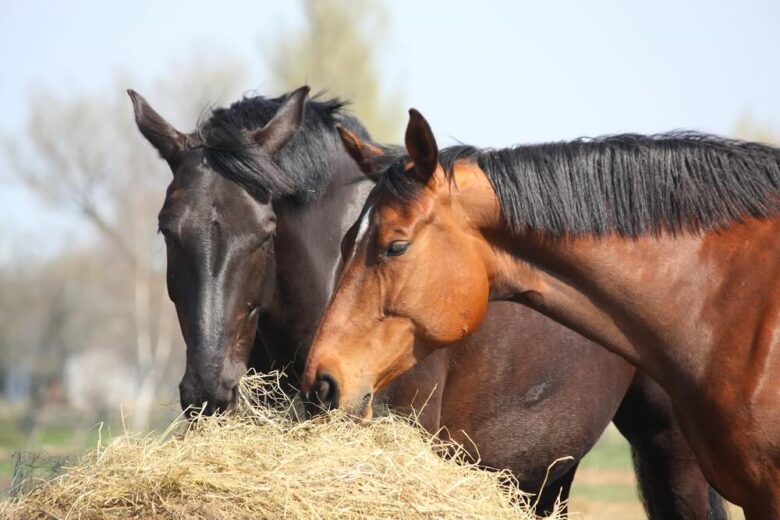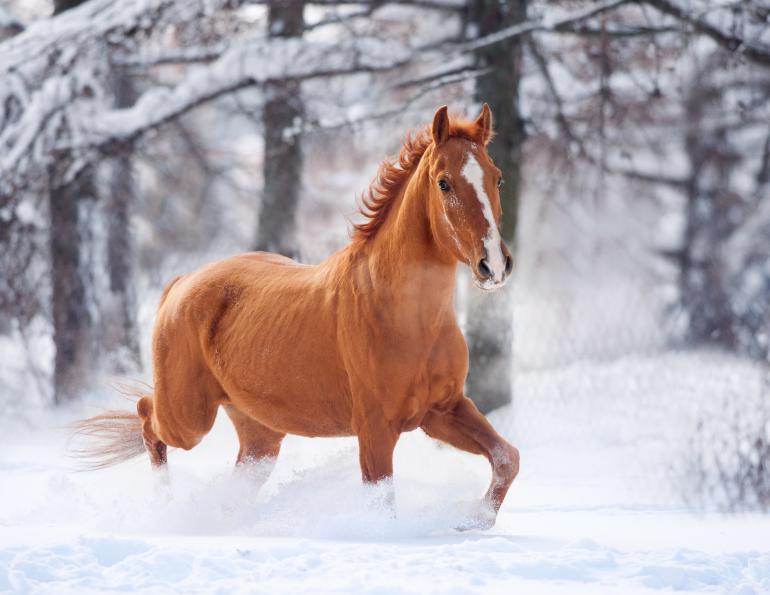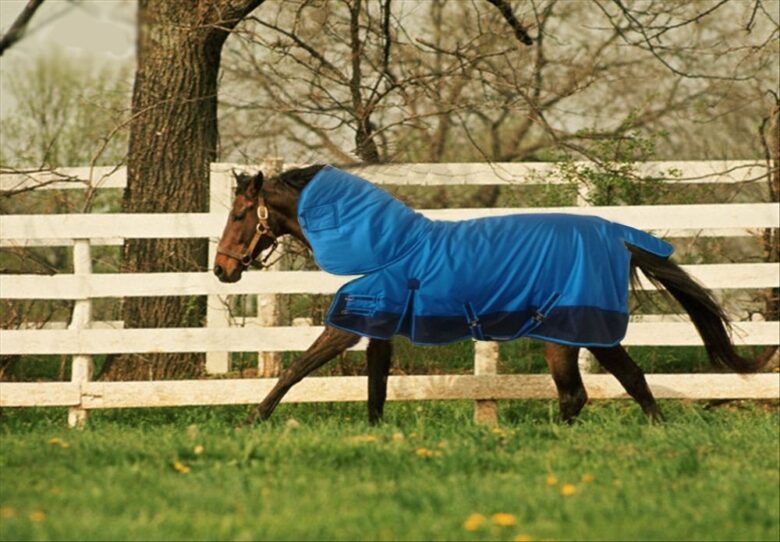Caring for a sick horse can raise significant vet bills and waste time. Unfavorable conditions resulting from climate change are one of the many variables that might contribute to horses experiencing avoidable health problems. In addition, the pasture quality shifts from summer to fall, and during the winter, when temperatures are lower, it can be challenging to find suitable grazing.
If you know what to anticipate and prepare for the constant changes in the weather, you can guarantee that your horse will remain healthy and content. In addition to keeping your horse safe, this will also help you avoid costly damage and repairs down the road. Read on for tips on protecting your horse during weather changes.
Contents
- Keep the Horse Warm in winter
- Provide Shelter for Your Horse in the Winter
- Ensure Your Horse Gets Adequate Nutrition
- Keep Your Horse Cool during the Hot Weather
- Maintain Regular Horse Vaccination and Deworming Schedule
- Take Care of Your Horse’s Hooves and Teeth
- Ensure That You Keep Up the Appropriate Levels of Fitness and Conditioning
- Wrapping Up
Keep the Horse Warm in winter

Source: albertafarmexpress.ca
A high-quality, custom-fit rug can be invaluable in keeping your horse in shape when the animal might otherwise waste a lot of energy just trying to stay warm. Fortunately, you can find different options of technical rugs thanks to Kentucky combo to protect your horse during weather changes. The rugs, which come in various sizes and thicknesses, create a different sensation of warmth. Rugs also aid in maintaining your horse’s body fat if they are young and energetic but has the propensity to gain weight.
With the proper setup, a horse can spend the entire year in the field, but it still needs a safe, dry place to sleep and plenty of food and water. A thick layer of winter hair provides excellent insulation for the horse throughout the colder months. On the other hand, if the hair coat gets wet, it will no longer offer the same level of insulation.
Provide Shelter for Your Horse in the Winter
When bad weather rolls in, your horse needs shelter from the elements, such as storms, wind, sleets, and snow. During the winter, provide your horse with a sturdy windbreak and an open-faced shed where they can go if they want to seek shelter from the terrible weather. Having unrestricted access to a stable or a shed with open sides is ideal, but trees can also function in a situation with no structure.
Proper saddle pads and quality riding gear along with a shelter are also incredibly important for your horses’ well-being during wintertime. Having the best saddle pads can significantly reduce saddle pressure, resulting in a more comfortable ride for your horse. There are many types of saddle pads, for example, cc saddle pad by LeMieux is a great choice for hunting rides but not for trail riding. So not only quality but the type of saddle pad is very important. Being equipped with properly fitted halters, lead ropes, and bridles, help to prevent injuries caused by misaligned tack or inadequate protection.
For all kinds of gear and especially saddle pads, deep research is important, as you may need to cooperate with different companies and seek their help while choosing the right accessory for your pet, so it’s better to deal with professionals. Treating your horse to the correct gear and shelter will result in a healthier and happier animal.
Ensure Your Horse Gets Adequate Nutrition

Source: waltham.com
The horse’s thick hair covering and subcutaneous fat prevent heat loss. However, an unwell, emaciated, skinny, or agitated horse cannot get enough protection from just its thick hair. Such a horse cannot tolerate unexpected colds, particularly if it does not have enough fodder to consume or is not maintaining adequate nutrition.
Your horse will need adequate and suitable nutrition to stay healthy and happy, especially during the colder months. The additional energy keeps the horse’s body temperature stable without causing body weight loss or cold stress. Therefore, for insulation during the colder months, the ideal covering you can give the horse is a modest amount of extra fat with plenty to eat and drink.
Keep Your Horse Cool during the Hot Weather
Your horse may experience the same level of anxiety in hot weather as in cold weather. While horses can adjust to warm and humid environments, high air temperatures and relative humidity can hinder their capacity to regulate their body temperature. You must provide your horse the special attention they need during these times to keep it healthy and happy.
Keep your horse hydrated by giving it small amounts of cold water frequently during the summer and in times of intense heat. If the heat from the scorching sun is too much, your horses will appreciate the reprieve that shade from trees or buildings may bring.
When both the humidity and temperature are high, it’s best to give your horse a break from riding. However, if you have to ride, the best times to do so are either very early in the morning or very late at night. Maintain a mild workload and give the horse plenty of opportunities to rest to recover his regular respiratory rate and body temperature.
Be careful not to push the horse’s physical performance beyond what it can handle, and always keep an eye out for normal perspiration. Electrolytes may be necessary for horses with excessive sweating. Provide adequate airflow around the horse by using fans. If it is feasible, exercise it in the shade.
If your horse suddenly stops perspiring, starts breathing excessively, or develops sluggish, agitated, or erratic behavior, you should contact a veterinarian as soon as possible.
Maintain Regular Horse Vaccination and Deworming Schedule

Source: horsejournals.com
Parasites become more active when the temperature drops, and they have the potential to multiply in pastures. The parasites expel through the horse’s waste, which might lead to health issues, including colic. The correct use of deworming medication is essential to minimizing the severity of the condition and preserving your horse’s health.
Stick to a deworming regimen that includes checking for parasites and treating infestations with the proper medication and dosage. Vaccines for horses strengthen their immune system and aid it in its battle against some of the most common equine diseases.
Take Care of Your Horse’s Hooves and Teeth
Remember to give your horse’s hooves the proper care regularly to help prevent diseases like thrush, chipping, and pain caused by changes in the weather. At least once a year, ensure your paddock-kept horse has its teeth checked by a qualified equine dentist. If not taken care of, teeth can grow sharp and cause discomfort and injury to the mouth.
Ensure That You Keep Up the Appropriate Levels of Fitness and Conditioning

Source: amazon.com
Training horses can be particularly challenging, especially during the spring, fall, and winter. However, your horse needs a particular degree of conditioning and fitness to perform well in races or easily take the usual trail ride.
In addition, proper training and conditioning improve the horse’s performance in various activities while lowering the risk of injury and other health complications. Fitness and conditioning ensure your horse’s joints, bones, ligaments, muscles, tissue, and circulation all respond to activity well during the weather changes.
Wrapping Up
Taking all necessary precautions to keep your horse safe from weather changes is crucial. Making sure that your horse has adequate nutrition, sufficient protection, and warmth during the winter months is all that you require.
Keep your horse hydrated and cool during the hot summer months. It is essential to pay attention to general care, which includes deworming, vaccinations, training, and conditioning. Finally, keeping up with routine appointments with your equine veterinarian is vital.
